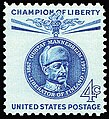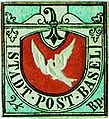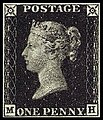Portal:Philately
| Philately portal | WikiProject Philately |
The Philately Portal
Philately is the study of revenue or postage stamps. This includes the design, production, and uses of stamps after they are issued. A postage stamp is evidence of pre-paying a fee for postal services. Postal history is the study of postal systems of the past. It includes the study of rates charged, routes followed, and special handling of letters.
Stamp collecting is the collecting of postage stamps and related objects, such as covers (envelopes, postcards or parcels with stamps affixed). It is one of the world's most popular hobbies, with estimates of the number of collectors ranging up to 20 million in the United States alone.
Epaulettes (French: Épaulettes, Dutch: Epauletten) is the name given by philatelists to the first series of postage stamps issued by Belgium. The stamps, which depicted King Leopold I with prominent epaulettes from which the name derives, became legally usable on 1 July 1849. Two denominations with the same design were issued simultaneously: a brown 10 centimes and a blue 20 centimes. They were produced as the result of a series of national reforms to the postal system in Belgium, based on the success of similar British measures adopted in 1840. The stamps allowed postal costs to be pre-paid by the sender, rather than the receiver, and led to a sharp increase in the volume of mail. Although quickly superseded by new types, Epaulettes proved influential and have since inspired several series of commemorative stamps. (Full article...)
Selected article -
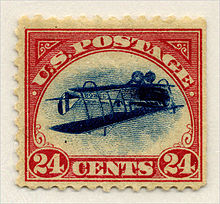
In philately, errors, freaks, and oddities (EFO) collectively refer to the wide variety of mistakes that may occur during the production of postage stamps.
Postal authorities generally take some care to ensure that mistakes do not get out of the printing plant; to be valid, the EFO stamps must have been sold to a customer. Mistakes smuggled out by employees are called printer's waste, not recognized as legitimate stamps, and may be confiscated from collectors; the Nixon invert is a well-known recent example of an apparent new error that turned out to be simple theft by insiders. The authorities may attempt to lay hands on legitimately sold errors, as happened with the original Inverted Jenny sheet, but usually, collectors are smart enough to hang onto the windfall. (Full article...)Selected images
Did you know (auto-generated)

- ... that both of Karl R. Free's New Deal-era U.S. post office murals with Native American subjects have been challenged as offensive?
- ... that in 1850, about a quarter of the post offices of the Swiss Post were located in taverns?
- ... that a new Christmas stamp that debuted in the 350-person town of Bethlehem, Georgia, in 1967 got so much attention that the two-employee post office had to hire forty-three temporary workers?
- ... that Argentinian Ricardo D. Eliçabe qualified as a physician, co-founded a petroleum refinery, and wrote about forgeries of Bolivia's first stamps?
- ... that in 2007, Arthur Gray's £2 Kangaroo and Map stamp sold for a world record price for a single Australian stamp?
- ... that after Irish post office clerk Maureen Flavin Sweeney reported worsening weather conditions, Dwight D. Eisenhower agreed to postpone D-Day by 24 hours?
General images -
Selected stamp -

1852 red sealing wafer Scinde Dawk stamp (Full article...)
List articles

- List of philatelists
- List of most expensive philatelic items
- List of postage stamps
- Lists of people on postage stamps (article) • (Category page)
- List of entities that have issued postage stamps (A–E)
- List of entities that have issued postage stamps (F–L)
- List of entities that have issued postage stamps (M–Z)
- List of postal services abroad
- Timeline of postal history
Related portals
Topics
Categories
WikiProject
![]() WikiProject Philately organizes the development of articles relating to philately. For those who want to skip ahead to the smaller articles, the WikiProject also maintains a list of articles in need of improvement or that need to be started. There are also many red inked topics that need to be started on the list of philatelic topics page.
WikiProject Philately organizes the development of articles relating to philately. For those who want to skip ahead to the smaller articles, the WikiProject also maintains a list of articles in need of improvement or that need to be started. There are also many red inked topics that need to be started on the list of philatelic topics page.
Selected works
- Williams, Louis N., & Williams, Maurice (1990). Fundamentals of Philately {revised ed.). American Philatelic Society. ISBN 0-9335-8013-4.
{{cite book}}: CS1 maint: multiple names: authors list (link) - Hornung, Otto (1970). The Illustrated Encyclopedia of Stamp Collecting. Hamlyn. ISBN 0-600-01797-4.
- Stuart Rossiter & John Fowler (1991). World History Stamp Atlas (reprint ed.). pub: Black Cat. ISBN 0-7481-0309-0.
Wikimedia
The following Wikimedia Foundation sister projects provide more on this subject:
-
Commons
Free media repository -
Wikibooks
Free textbooks and manuals -
Wikidata
Free knowledge base -
Wikinews
Free-content news -
Wikiquote
Collection of quotations -
Wikisource
Free-content library -
Wikiversity
Free learning tools
Other Portals
Sources
- ^ "Philatelic Collections: General Collections". British Library. 2003-11-30. Archived from the original on 30 June 2011. Retrieved 2011-01-16.





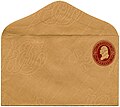
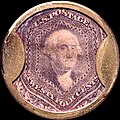
![Image 4Unissued 1956 £1 Jamaican chocolate and violet, the first stamp designed for Queen Elizabeth II. Held in the British Library Crown Agents Collection.[1]](http://upload.wikimedia.org/wikipedia/commons/thumb/9/9b/Stamp_Jamaica_1956_unissued_1sh.jpg/120px-Stamp_Jamaica_1956_unissued_1sh.jpg)























